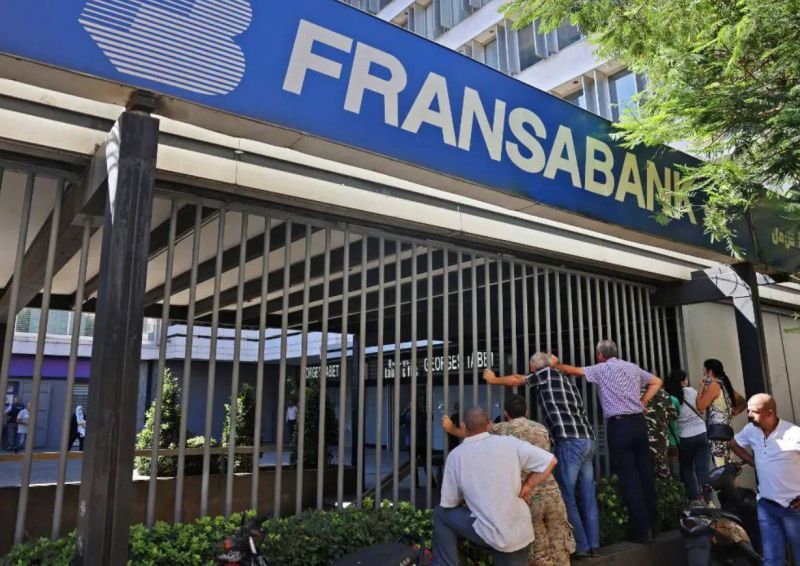
Depositors queuing in front of a branch of Fransabank in Beirut, Sept. 26, 2022. (Credit: Joseph Eid/AFP)
In the latest of a series of cases against Lebanese banks for blocking access to depositors’ savings, the Mount Lebanon Advocate-General pressed charges this week against Fransabank top brass, following a lawsuit last year by a depositors’ rights activist.
Judge Rami Abdallah, the Advocate-General at the Court of Appeal, pressed charges on Tuesday against Fransabank board of directors chairperson Nadim Kassar and former chairperson Adnan Kassar.
This information was confirmed to L’Orient-Le Jour by a judicial source, who said that the case was referred to Nicolas Mansour, First Investigative Judge at the Mount Lebanon Court of Appeal. The latter may take charge of the case himself or decide to transfer it to another investigative judge.
The prosecution’s action is based on a complaint filed in November by Firas Tannous, co-founder of Our Money is Ours association, requesting that his deposits be returned at their real value. Since the start of the economic crisis in 2019, Lebanese banks have restricted depositors’ access to their foreign currency funds and forced them to withdraw them at a discount.
The complaint was initially lodged with Mount Lebanon Court of Appeal General Prosecutor Ghada Aoun. Fransabank had filed a lawsuit against the state alleging serious fault by judge Aoun before the plenary session of the Court of Cassation. The latter is unable to meet due to a lack of quorum following the retirement of six of its 10 members.
In his decision, Judge Abdallah cited four charges: Fraud, breach of trust, breach of the obligation to lift banking secrecy and bankruptcy fraud. These crimes are punishable by imprisonment and fines under Articles 655, 671 and 690 of the Code of Criminal Procedures, and the Banking Secrecy Law of 2022, which also mentions the Anti-Money Laundering Law.
Fransabank’s communications department stated in recent days that it was not aware of Judge Abdallah’s prosecution decision.
“The case is ongoing but we have not been notified of any new developments,” a bank official told L’Orient-Le Jour.
Tannous is expecting a child in February. “I need my money back,” he said, determined “not to deny his future baby anything.” He stated that the funds he is demanding are in a current account. “I don’t want anyone arguing that my money is with the state, knowing that I didn’t put it in a frozen account, but in an account that allows me to withdraw it at any time,” he said.
Outside the banking system
Regarding the refusal to lift banking secrecy in Judge Abdallah’s decision, Tannous said that “during the investigation, Fransabank did not comply with the judicial request to disclose some information.”
“Few banks, however, have not lifted banking secrecy during the legal proceedings we have brought against them,” said the activist who has handled more than 50 depositors’ cases.
“In collaboration with the lawyers working with Our Money is Ours, we have reached agreements with a number of banks that we had taken to court, and that have been cooperative, not only in providing information but also in drawing up plans to eventually return some of their customers’ deposits,” said Tannous.
His Fransabank account was closed 10 months ago through a banker check deposited with a notary. He tried to remedy the situation by appealing to the Beirut First Instance Court, presided over by Zalfa Hassan.
In May, the court ordered the bank to reopen its client’s account, with a fine of LL100 million per day of delay. But in August, the Court of Appeal’s chamber presided over by Habib Mezher, to which Fransabank appealed to overturn the ruling of the lower court, issued a ruling suspending the execution of the judgment.
The Court of Appeal’s decision may be appealed before the Court of Cassation. Pending this procedure, Tannous is still unable to withdraw the monthly $400 to which he is entitled as a depositor, by virtue of Banque du Liban (BDL) circulars.
“I find myself outside the banking system,” he said.
This article was originally published in French in L'Orient-Le Jour. Translation by Joelle El Khoury.